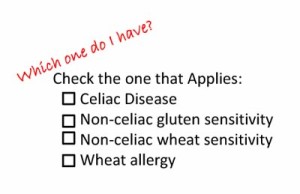Wheat or Gluten Sensitivity or Celiac Disease? Which do I have?
November 6, 2013 by Amy Leger | G+ Amy LegerNew research out this week talks about Non-Celiac Wheat Sensitivity (NCWS). You read it right…wheat sensitivity, not gluten sensitivity.
Researchers say there is a portion of folks diagnosed with Irritable Bowel Syndrome that actually have NCWS. Is NCWS news to you? I hate to say it, but it was to me! So knowing this is out there, I thought I would give a quick summary on the disorders that are now associated with wheat or gluten.
Celiac Disease
This is an autoimmune disorder. You need the HLA DQ2 or 8 gene, gluten consumption and an environmental trigger. Symptoms of undiagnosed celiac disease manifest themselves in more than 200 ways (according to the University of Chicago’s Celiac Disease Center); including vomiting, diarrhea, anemia, depression, brain fog, fatigue, migraines poor tooth enamel, infertility and more.
In celiac disease, gluten is toxic to the patient’s gut. It wipes out the villi in the small intestine (the finger-like projections that grab your nutrients); this process of flattening the villi is commonly known in the medical world as villious atrophy. If celiac is left untreated, it can lead to overall poor health, cancer and osteoporosis.
Testing for celiac disease includes a celiac panel of blood tests and an endoscopy and biopsy of the small intestine.
Non-Celiac Gluten Sensitivity (NCGS)
This is not celiac disease. Folks with non-celiac gluten sensitivity, can have similar symptoms as above, but they don’t have villous atrophy. They may not feel good when they have gluten, but they are not at a risk of getting cancer if they ingest gluten like you are with celiac disease.
Patients with gluten sensitivity may get the celiac panel blood test and possibly biopsy to rule in or out celiac. There is no gene that can be tested in NCGS. This area is still under a lot of research to get more concrete evidence for diagnosis. Click here to read more about non-celiac gluten sensitivity
Non-Celiac Wheat Sensitivity (NCWS)
Non-Celiac Wheat Sensitivity is relatively new. In December of 2012, the American College of Gastroenterology published research on the very subject. It says that a third of the Irritable Bowel Syndrome patients studied for this research who underwent a double-blind, placebo-controlled challenge actually had non-celiac wheat sensitivity.
This research found two subgroups of patients: one that had symptoms similar to celiac disease and another group where the patients were suffering from multiple food sensitivities which had clinical features like those found in allergic patients. It is hypothesized that the ones that had symptoms similar to celiac could be “predisposed to develop villous atrophy — ‘overt celiac’ — in the future,” but more research is needed in this area.
This week, the American Journal of Gastroenterology published a follow up review on the subject. It concluded that patients with non-celiac wheat allergy may have Non-IgE mediated food allergies. Newswise published the news release on the subject which defined non-IgE mediated and and IgE mediated food allergies this way:
“In IgE mediated food allergies, people develop symptoms almost immediately after eating, and when blood and skin tests are carried out, there is a positive marker. Non-IgE mediated food allergies, including celiac disease, primarily affect the GI mucosa (the innermost layer of the gastrointestinal tract) and have a delayed onset of symptoms, which can make it difficult to diagnosis.” – Newswise.com November 5, 2013
In other words, IgE mediated food allergies is what we know as a traditional food allergy. Non-IgE may be more difficult to pinpoint from a doctor’s perspective.
Wheat Allergy
The Mayo Clinic defines a wheat allergy simply as an allergic reaction to foods containing wheat. It also spells out the difference between a wheat allergy and celiac disease:
“A wheat allergy generates an allergy-causing antibody to proteins found in wheat. But, one particular protein in wheat — gluten — causes an abnormal immune system reaction in the small intestines of people with celiac disease.” – MayoClinic.com accessed November 6, 2013
Testing for a wheat allergy will usually include a combination of tests, like a skin test, food diary or a pill that has the potentially allergy-inducing agent, reports the Mayo Clinic.
My final tips:
If you think you are having an allergic reaction to wheat, go to your doctor right away.
If you think you may have one of the other options listed above, please see your doctor and get started by asking for the celiac panel (blood tests). It is the first step in finding answers.
CAUTION! What you DON’T want to do is start eliminating gluten from your diet before getting the tests started. You must have gluten in your system to get an accurate reading for the celiac panel and possible follow-up biopsy. My non-expert opinion says the same may be said for keeping wheat in your diet in the case of NCWS. Without the wheat, the tests could end up as a false negative. Again, NCWS is a relatively new “discovery” (for lack of a better word), so I am not certain a general practitioner will know much about it.
*Disclaimer: I am not a medical practitioner. If you have concerns about one of these medical issues, please be sure to discuss all of this with your doctor.
Tags: allergy, celiac, disease, gluten, gluten-free, inolerance, sensitivity, wheat




November 9th, 2013 at 11:30 am
People when allergy is so sensitive to things that would trigger their allergy putting them to dangerous situation.